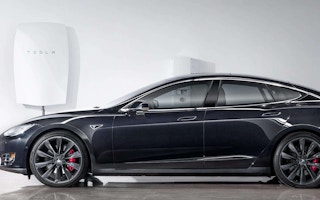Tesla Motors’ highly anticipated “missing piece” was finally unveiled by CEO Elon Musk during a press conference in California on April 30.
The Powerwall home battery and the Powerpack storage solution for commercial customers were introduced to an enrapt audience, with Musk speaking passionately of his aim to power the world with solar+storage.
The headline-grabbing Powerwall will be offered this summer to US customers, available in a 10kWh version retailing at $3,500, and a 7kWh version on the market for just $3,000.
The larger powerwall is optimized for backup applications for when the grid goes down, while the smaller 7kWh Powerwall can be easily paired with a solar PV system and used in daily cycling to extend the environmental and cost benefits of solar.
“
We see growth in the energy storage market as fundamental to the widespread adoption and development of renewable energy technologies, and we are excited that domestic storage is already moving towards a reality.
Nina Skorupska, chief executive, Renewable Energy Association UK
Musk remarked that the world could meet its energy needs with two billion Powerwall battery systems. “That may seem like an insane number,” he said, “but we’re talking about trying to change the fundamental energy infrastructure of the world.”
The batteries will initially be produced at Tesla’s factory in Fremont, California, before production moves to the company’s “Gigafactory” in Nevada.
According to Tesla, the home battery system is ideal for load shifting – charging during low rate periods and discharging stored power during peak demand periods – and is also the perfect companion to a home solar system.
Musk is also chairman and co-founder of US solar company SolarCity, and Tesla’s Powerwall is considered the final affordable piece to the distributed generation puzzle.
Game-changing launch
Tesla’s influence in the electric vehicle (EV) market has been to dramatically alter the perception of EVs as little more than expensive golf carts. Whether the same can be done for home storage solutions remains to be seen, but Tesla’s sleek design, its low cost and the slick marketing and presentation that comes with anything Musk-affiliated could prove pivotal in opening up the home and commercial storage market.
“Maybe Tesla is about to demolish the idea that we can’t switch from coal and gas to wind and solar because of reliability issues,” clean energy entrepreneur Felix Kramer told the Guardian. “If they convince consumers, that changes the conversation.”
The early signs are that Tesla has once again succeeded in capturing the Zeitgeist. Facebook, Twitter and much of social media was abuzz Friday morning with news of the announcement, and sometimes that is all it takes for an idea to gain a toehold in the public’s collective consciousness.
The UK’s Renewable Energy Association (REA) commented today that the Tesla Powerwall demonstrates just how close the industry is to a commercially viable domestic energy storage market.
“Having affordable and efficient energy storage available means individual households can really start to change the way they use energy and considerably reduce the need for fossil fuels,” said REA chief executive Nina Skorupska.
“We see growth in the energy storage market as fundamental to the widespread adoption and development of renewable energy technologies, and we are excited that domestic storage is already moving towards a reality.”
Equally exciting for the solar industry is the launch of the Powerpack, a 100kWh battery designed for use with commercial-scale solar applications. Amazon is already using a pilot Powerpack in Northern Carolina, and more and more businesses with solar installed are expected to be interested in the Powerpack when it becomes available in a few months.
Following Tesla’s announcement, Deutsche Bank said that the technology could net the company around $4.5 billion in revenue.










